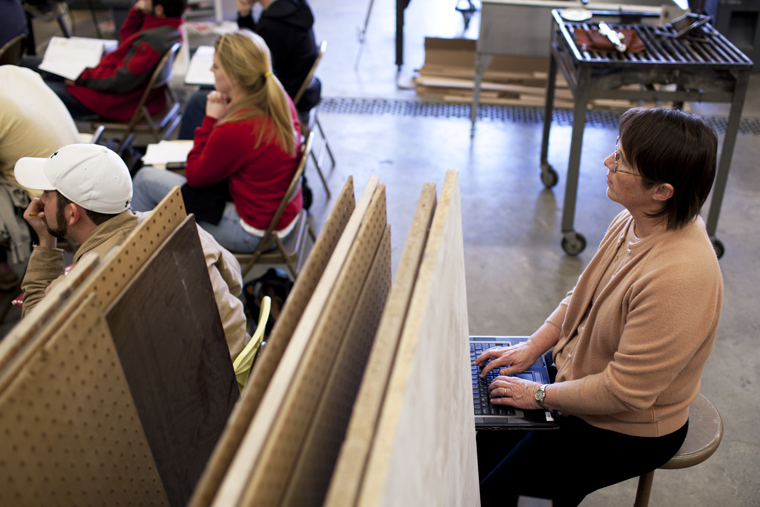Captionists help deaf students keep up in class
February 15, 2011
Cortney Scott is an agriculture education major and is ahead of schedule on academic hours.
She is also considered half deaf.
Scott, Clarksville senior who is in her thrid year at WKU, is gradually losing hearing in both of her ears.
“They think I was born with it, but they’re not sure,” said Scott, who uses aids for both ears.
Scott is one of seven students at WKU who uses the captioning system provided by the Deaf & Hard of Hearing Services, coordinator Sarah Gibbs said.
The system, run by a program called C-Print, allows students to read everything spoken in the classroom as it is typed by a hired individual called a captionist.
“We type everything that’s said in class,” Gibbs said.
This includes comments and jokes made by students, she said.
After class, the captionist saves the content, edits for grammar or other mistakes and e-mails the transcript to the student.
“It’s a real-time accommodation,” Gibbs said.
Captionists use a variety of abbreviations and shorthand, aiming to record “concept for concept, not necessarily word for word,” she said.
Gibbs said without the system, students would be struggling to understand the content of the lecture or discussion.
“The student would be trying to lipread or trying to catch what the (professors) said,” Gibbs said. “This helps them get all the information they need to be successful in the classroom.”
WKU has the largest captioning program in the state, Gibbs said.
“Our Deaf & Hard of Hearing Services may not be the largest, but our C-Print is,” she said.
The program is also used on other media, such as Youtube clips and short videos.
“We try and get them beforehand so that we can caption them and the student has the transcript to read during class,” Gibbs said.
She also said C-Print can be used for services outside of the classroom, such as guest speakers and “anything that the university sponsors.”
Scott said that in high school, she used the 504 Plan, which ensures students will not be segregated or discriminated in the classroom, according to Section 504 of the Americans with Disabilities Act.
However, Scott said the 504 Plan does not legally require the school to provide accommodation services.
“In high school, I had to do a lot of fending for myself and advocating for myself,” she said.
When Scott toured WKU, she met with Student Disabilities Services and learned about what they offer.
“That was the determining decision,” she said. “I knew I wanted to be here. It felt like home.”
Scott uses the captioning to supplement her note-taking.
“If I miss something or misunderstand something, I can go back,” she said. “It helps me have a better overall understanding.”
Karen Porter, who works full time with the captioning system, is one of Scott’s four captionists.
Porter, a WKU alumna and captionist for three years, applied for the position after seeing an ad in the newspaper.
“I’m retired, and I was looking for something that I thought would be personally rewarding,” Porter said.
Porter captions for three different students this semester but said it varies depending on students’ schedules.
“Our goal is really to blend in the classroom,” she said. “Captioning is really to help our students have the same experience that any other student would have.
“We’re trying to level the playing field for our students as much as possible.”
Porter said she is with the students in class, regardless of the circumstances.
She said her strangest experience was providing captions during an animal science class.
“One day, they were dissecting the stomach of a cow,” she said.
Porter also sees her job as a challenge.
“I can kind of personally motivate myself,” she said.
Porter said she enjoys knowing her position is impacting her students.
“I feel like I am providing a service to students that will have a difference in their lives,” she said. “I just have the best of all worlds.”

























